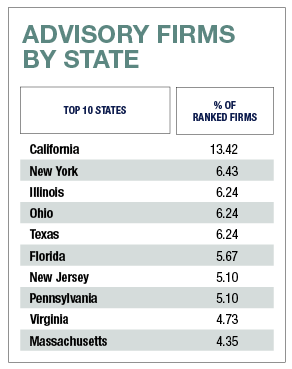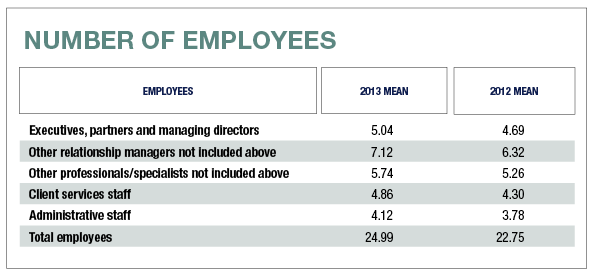A year ago in our prior RIA survey cover story, we spoke about the profession possibly entering a golden age where numerous stars were aligned in its favor, including the ascendency of the fee-based model, the increasing attractiveness of going independent and the greater awareness of fiduciary responsibility among the investing public.

And based on figures from Financial Advisor’s 2014 RIA survey, the good times kept rolling along as total asset growth jumped more than 20% last year among the 529 companies we measured. That’s up slightly from the nearly 19% growth during 2012, seemingly confirming that the RIA space is in a nice groove.
“I think RIAs are in a very good place,” says John Furey, principal and founder of Advisor Growth Strategies, a Phoenix-based wealth management consulting firm. “For me, it’s still the best channel to grow in, and I don’t see anything on the horizon to change that.”
But to quote the Grateful Dead, when life looks like easy street there is danger at your door. Many RIA firms, particularly those that didn’t grow through mergers or acquisitions, can thank the raging bull market in equities since 2009 for a big chunk of their recent AUM growth, including last year’s 30% gain in the S&P 500. But that won’t last forever, so then what?
And other threats loom on the longer-term horizon such as regulatory uncertainty, the rise of robo-advisors and the dearth of new talent in a graying industry.
“It’s a sweet period for RIAs, but now’s the time to do some strategic planning,” Furey says. “How do I insulate my firm if the market turns against me? Given the competitive threats, what can I do to make sure the growth continues?”
 The economy can also play a role in the well-being of RIA practices, and our survey found a mixed bag regarding financial advisors’ take on whether the local and/or national economy impacted their business. Folks in markets such as San Francisco, New York City and Charlotte, N.C., as well as both Houston and the Dallas/Fort Worth area (and Texas in general) said they’ve benefited from healthy growth in their local economies.
The economy can also play a role in the well-being of RIA practices, and our survey found a mixed bag regarding financial advisors’ take on whether the local and/or national economy impacted their business. Folks in markets such as San Francisco, New York City and Charlotte, N.C., as well as both Houston and the Dallas/Fort Worth area (and Texas in general) said they’ve benefited from healthy growth in their local economies.








